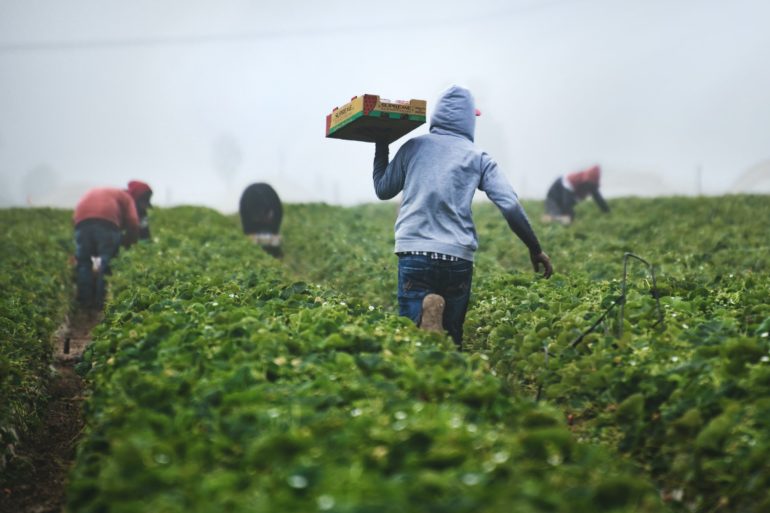Author: Katherine Marsden, Moneyless Society Volunteer
Food, along with clean water, is the essence of life. After all, we need to eat to survive. Food is easy to take for granted as it appears on the store shelves and on restaurant menus in a wide variety and huge abundance (for those who can afford it). Conscious consumers shop for the best deals amid the fear of rising food costs during times of crisis (i.e. the pandemic). But does anyone stop to think about where or from whom, that food comes? How much consideration is given to how fragile and exploitative food supply chains are by nature of design?
The food comes from the land and from the farmworkers who put in the labor of cultivating the land to grow our fruits and vegetables and tend to the animals. Farmworkers do back breaking labor for minimal pay to bridge the gap between the land and our table. Seventy Three percent of farmworkers are immigrants, many of (1.) them illegal. Many live in fear of being hunted down by ICE while doing the very important job of feeding us. Because American citizens can get better paying, less strenuous and less useful jobs, there is a shortage of farmworkers. This means that we allow temporary H2-A visas for immigrants to do agricultural work. These workers work under even more oppressive conditions. Some are even forced to work at gunpoint and in miserable living conditions, with passports confiscated as in a recent case.(2.)
Wessley Roberts, a former migrant farmworker outreach worker describes the deplorable conditions. “Many (migrant farmworkers) never see their pay and are literally held in debt bondage and trafficked around the country by crew leaders to follow the seasonal work. Rape, assault, murder, trafficking, chemical poisoning, heat stroke, overwork to the point of giving out, housed in rotting trailers and structures with broken glass instead of windows… farmworkers endure pure hell to put food on our tables.” So what is the solution?
How do we still have food and treat the farmworkers with dignity? The answer isn’t demanding higher wages. Higher wages will just mean higher food prices for already cash strapped consumers, thanks to greedy corporations that will strive to compensate for raising wages under the guise of “inflation”. Still, immigrant harassment and poor working conditions will continue. However, there is a promising alternative – farmworkers could instead petition directly to consumers and the government for workers’ basic needs. This is what that might look like –
- Don’t take food for granted. Value food and farmworkers over money and things. This will require a radical cultural change in our societal values, which currently prize a kitchen remodel or electronics over food. It is, however, critical to food security and farmworker justice.
- Offer legal residency and a path to citizenship for all farmworkers. Farmworkers can’t feed us while being hunted down by ICE and living in fear.
- Localize food production and distribution. Ask communities to localize food by starting community farms, both traditional as well as back yard gardens. Hire farmworkers to help work the local farms in exchange for housing and basic needs as part of their compensation. Offer the produce for free to the community. These farms would be exempt from strike, and provide food security that is not dependent on the global supply chains and more environmentally friendly and humane agriculture.
- Teach farming in the schools and present farming as an honorable and viable career choice. We need farmers, farmworkers and food for the future.
- Provide decent housing to farmworkers, by way of sustainable housing implementation such as 3D printing. Contractors and union brothers and sisters build suitable housing for farmworkers. Landlords offer free rent.
- Medical care. Doctors volunteer to offer clinics. Doctors, hospitals, pharmacies offer treatment free of charge (not insurance).
- Essentials. Other companies that provide essential services, from grocery to cell phone service to utilities offer farmworkers service for free. Even car manufacturers or dealerships could offer shared vehicles for the farmworkers. We thank and pay the farmworkers by bringing up their standard of living directly.
- Governments offer incentives. Offer tax credits to those who help the farmworkers via the goods and services mentioned above. Governments can also fund the local farms through grants. So called philanthropists could offer funding for local farms and farmworker living costs as well.
- Allow volunteers from the general public to come in and work the fields, especially in the event of strike.
- Assure the longevity of farmworker support by putting the land used for housing in trust for farmworkers. Welcome and train the volunteers from the greater community who will be working the farms.
- Members of the public who don’t have a relevant skill to contribute can donate money for farmworker living expenses. This should also be tax deductible.
Finally, if living standards for farmworkers have not been raised after a year, then the farmworkers should strike, not for money, but for help from the public and their government as described above.
As a society we need to treat the people that feed us better than we have/do currently. We do this by providing basic needs, legal residency, and dignity. Moving forward, if we localize food as much as possible to provide for our own food security, we can avoid supply chain disruptions due to natural disasters, or financial collapse. As automation makes operations more efficient, we have the opportunity to reduce hours, whilst increasing compensation. We can feed everyone and using technological advancements, improve the standard of living for all. We need community. We need food. What we don’t need is money. Through acknowledging our interdependence, we can achieve our food goals and all of humanity’s highest potential.
- https://www.fwd.us/news/immigrant-farmworkers-and-americas-food-production-5-things- to-know
- https://www.vice.com/en/article/m7v38x/south-carolina-balcazar-human-trafficking-farm-workers

Listen to the Moneyless Society Podcast here
Join the MoSo online forum here
Follow MoSo Memes here


